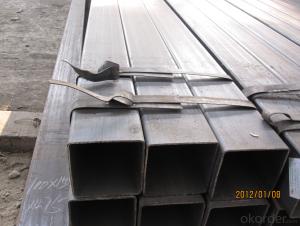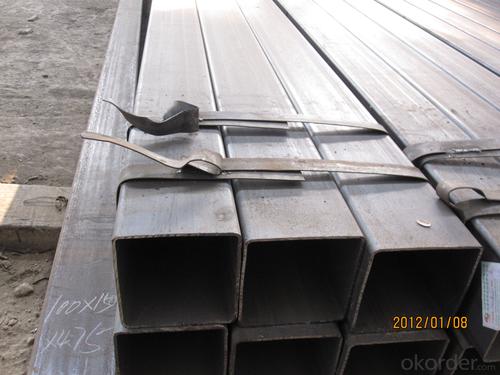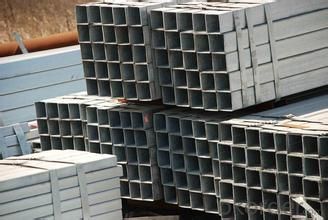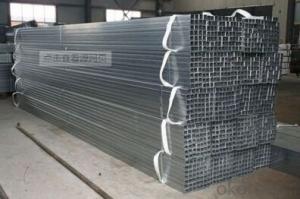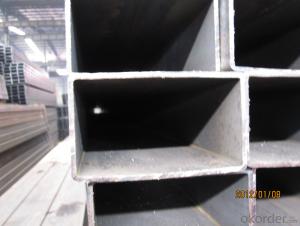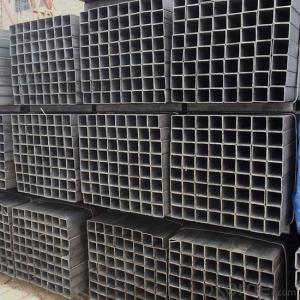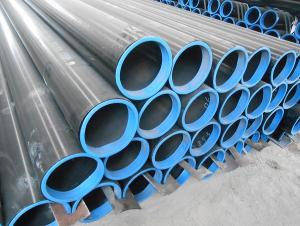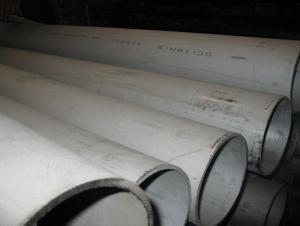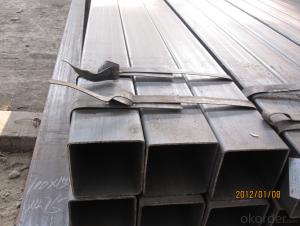Rectangular Hot Rolled Steel Pipe
- Loading Port:
- China Main Port
- Payment Terms:
- TT or LC
- Min Order Qty:
- -
- Supply Capability:
- -
OKorder Service Pledge
OKorder Financial Service
You Might Also Like
Quick Details
| Thickness: | 1.0 - 35 mm | Section Shape: | Square | Outer Diameter: | 20*20-600*600 |
| Place of Origin: | Shandong China (Mainland) | Secondary Or Not: | Non-secondary | Application: | Structure Pipe |
| Technique: | Cold Rolled | Certification: | CE | Surface Treatment: | oil,paint |
| Special Pipe: | Thick Wall Pipe | Alloy Or Not: | Non-alloy | Name: | Square Hollow Steel Pipe/Tube |
| Shape: | Square/Rectangular | Yield Strength: | 360-380Mpa | Tensile Strength: | 560-580Mpa |
| Elongation: | 24-28% | Bend Test: | Qualified | Impact Value: | V-notch |
| Grade: | 20#,45#,16Mn,A210,St45,Q235,Q345,Q195,Q215,10#-45#,A53-A369,ST35-ST52,Q195-Q345 | Standard: | JIS G3465-2006,JIS G3466,GB/T 3094 |
Specifications
1.OD:15X15-800X800MM,20X30--600X800MM
2.Thick.:1.0--35.0MM
FAQ of Hollow Section
①How is the quality of your products?
Our products are manufactured strictly according to national and internaional standard, and we take a test
on every pipe before delivered out. If you want see our quality certifications and all kinds of testing report, please just ask us for it.
Guaranteed: If products’ quality don’t accord to discription as we give or the promise before you place order, we promise 100% refund.
②How about price?
Yes, we are factory and be able to give you lowest price below market one, and we have a policy that “ for saving time and absolutely honest business attitude, we quote as lowest as possible for any customer, and discount can be given according to quantity”,if you like bargain and factory price is not low enough as you think, just don’t waste your time.Please trust the quotation we would give you, it is professional one.
③Why should you chose us?
Chose happens because of quality, then price, We can give you both.Additionally, we can also offer professional products inquiry, products knowledge train(for agents), smooth goods delivery, exellent customer solution proposals.Our service formula: good quality+good price+good service=customer’s trust
SGS test is available, customer inspection before shipping is welcome, third party inspection is no problem.
Rectangular Pipe Image
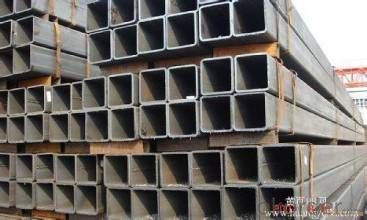
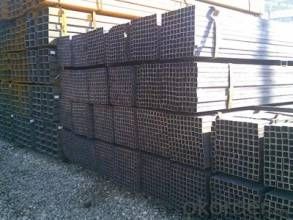
- Q: What is the theoretical weight per square meter of the steel pipe diameter of the outer frame and the thickness of the tube wall 3mm 48mm?
- Dimensions of ordinary steel tubes (taken from GB/T 17395-1998)The theory of weight / (kg/m) | wall thickness (2.9 3.0mm: 3.33)
- Q: Can steel pipes be used for wastewater disposal?
- Yes, steel pipes can be used for wastewater disposal. Steel is a durable and corrosion-resistant material, making it suitable for transporting and disposing of wastewater safely and efficiently.
- Q: Can steel pipes be used for structural supports?
- Yes, steel pipes can be effectively used as structural supports due to their high strength, durability, and ability to withstand heavy loads.
- Q: What are the different methods of pipe coating for steel pipes?
- There are several methods of pipe coating for steel pipes, including fusion-bonded epoxy (FBE) coating, three-layer polyethylene (3LPE) coating, three-layer polypropylene (3LPP) coating, and liquid epoxy coating. Each method offers different levels of protection against corrosion, abrasion, and other environmental factors, ensuring the durability and longevity of the steel pipes.
- Q: What is the role of steel pipes in power plants?
- Steel pipes play a crucial role in power plants as they are used for transporting various fluids, such as water, steam, and fuel, throughout the facility. They provide a durable and reliable means of conveying these substances under high pressure and temperature conditions, ensuring efficient energy generation and distribution. Additionally, steel pipes are essential for the cooling systems in power plants, allowing for the safe transfer of heat from the facility to the environment.
- Q: Can steel pipes withstand high temperatures?
- Yes, steel pipes can withstand high temperatures. Steel is a strong and durable material that has high heat resistance. It can retain its strength and structural integrity even when exposed to extreme heat, making it suitable for various high-temperature applications such as industrial furnaces, power plants, and steam pipelines.
- Q: What are the different wall thicknesses available for steel pipes?
- Steel pipes are available in various wall thicknesses to meet specific requirements and applications. Different schedules indicate the wall thickness. The most commonly used wall thicknesses for steel pipes are Schedule 40, Schedule 80, and Schedule 160. Schedule 40 pipes have a medium wall thickness and are commonly used for general-purpose applications, like conveying fluids and gases. They are suitable for low-pressure systems and widely used in plumbing, HVAC, and irrigation systems. Schedule 80 pipes have a thicker wall compared to Schedule 40 and are designed for high-pressure applications. They are commonly used in industrial settings, oil and gas pipelines, and high-pressure fluid transport systems. The increased wall thickness ensures higher strength and durability to withstand pressure. Schedule 160 pipes have the thickest wall among the available options. They are designed for extremely high-pressure applications, such as refineries, chemical plants, and power generation facilities. These pipes offer exceptional strength and can handle intense pressure and stress in industrial environments. In addition to standard schedules, there are other wall thicknesses available for specific purposes. For instance, extra-strong (XS) pipes have a thicker wall than Schedule 80 pipes and are used for applications requiring even higher pressure resistance. It is crucial to consult professionals or refer to industry standards to determine the appropriate wall thickness for a specific application. Factors like fluid or gas pressure, temperature, and environmental conditions should be considered when selecting the suitable steel pipe with the desired wall thickness.
- Q: Can steel pipes be recycled after their useful life?
- Yes, steel pipes can be recycled after their useful life. Steel is a highly recyclable material, and this includes steel pipes. Recycling steel pipes involves collecting the used pipes, cleaning them to remove any contaminants, and then processing them into new steel products. The recycling process helps to conserve natural resources, reduce energy consumption, and minimize waste. Additionally, recycling steel pipes helps to reduce the environmental impact associated with the production of new steel.
- Q: What is the difference between steel pipes and ductile iron pipes?
- Steel pipes and ductile iron pipes are both commonly used for plumbing and industrial applications, but there are notable differences between them. The main difference lies in their composition and mechanical properties. Steel pipes are made primarily from iron and carbon, with small amounts of other elements added for strength and corrosion resistance. On the other hand, ductile iron pipes contain a higher percentage of carbon and small amounts of other elements like silicon and manganese, which give them improved ductility and resistance to cracking. Consequently, steel pipes are typically stronger and more rigid, suitable for high-pressure applications, while ductile iron pipes offer better flexibility and impact resistance, making them ideal for underground installations and areas prone to ground movement. Additionally, steel pipes are usually more expensive than ductile iron pipes due to their higher strength and corrosion resistance.
- Q: What is the lifespan of galvanized steel pipes?
- The lifespan of galvanized steel pipes can vary depending on several factors such as the quality of the galvanizing process, the environment in which they are installed, and how well they are maintained. However, on average, galvanized steel pipes can last between 40 to 70 years before they may start to show signs of corrosion or degradation.
Send your message to us
Rectangular Hot Rolled Steel Pipe
- Loading Port:
- China Main Port
- Payment Terms:
- TT or LC
- Min Order Qty:
- -
- Supply Capability:
- -
OKorder Service Pledge
OKorder Financial Service
Similar products
Hot products
Hot Searches
Related keywords
